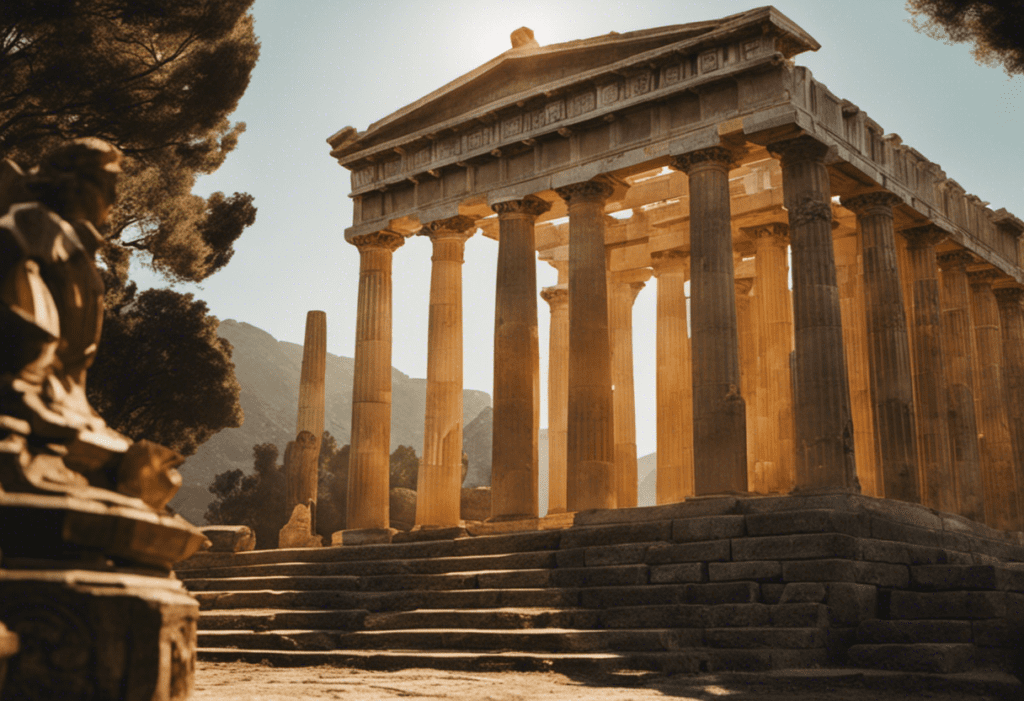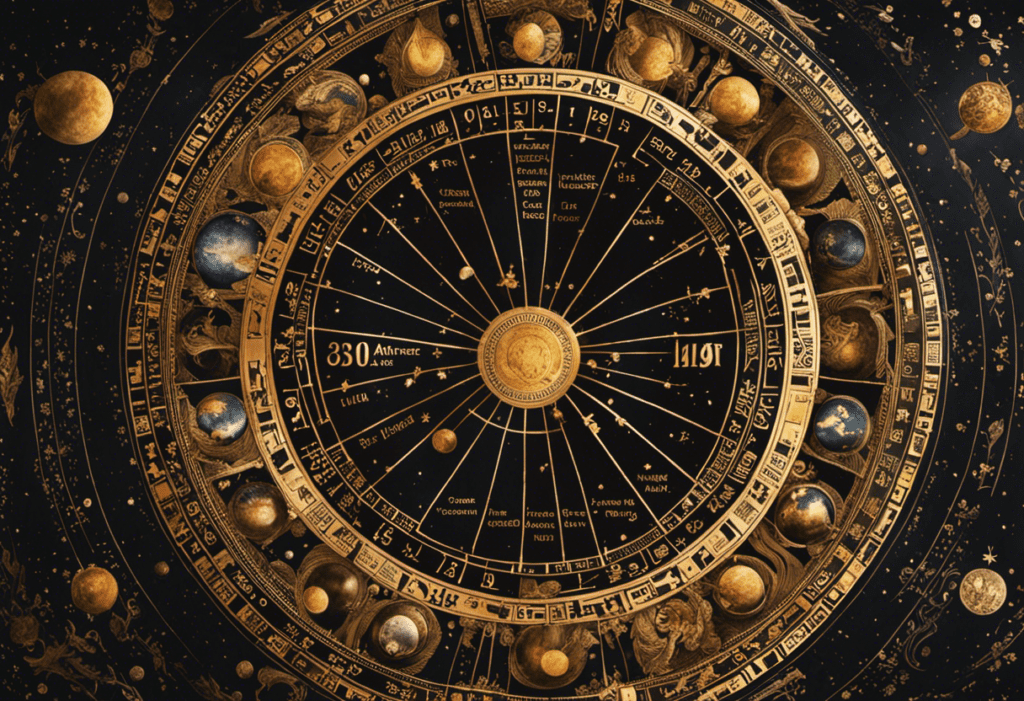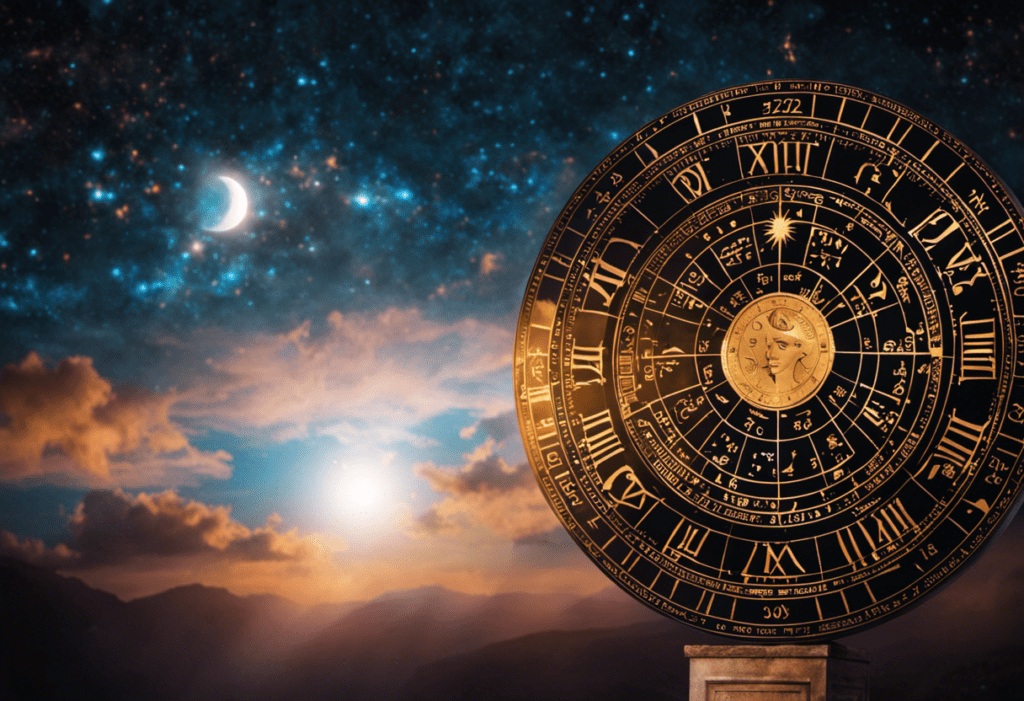Step into the realm of antiquity as we unveil the sacred tapestry of the ancient Greek calendar.
Delve into the celestial dance of gods and goddesses, explore the significance of festive rites, and unravel the intricate web of religious rituals.
With a meticulous eye, we shall navigate the astrological influences that shaped this hallowed calendar, tracing its enduring legacy in the modern world.
Prepare to be transported, as we embark on a journey through time, uncovering the religious depths of the ancient Greek calendar.
Key Takeaways
- The Ancient Greek calendar originated from early civilizations in the Mediterranean region and was influenced by agricultural practices, lunar observations, and religious beliefs.
- The Greek pantheon consisted of various gods and goddesses, each with their own domains and responsibilities, such as Zeus, Hera, Athena, and Apollo.
- Festivals and celebrations in the Greek calendar served as opportunities for communal worship, fostering unity, and exploring societal norms. The Olympic Games also played a significant role in promoting Greek identity.
- Religious rituals and offerings, including sacrificial ceremonies, processions, libations, and food offerings, were used to communicate with the gods and reinforce a sense of community and divine connection.
The Origins of the Ancient Greek Calendar
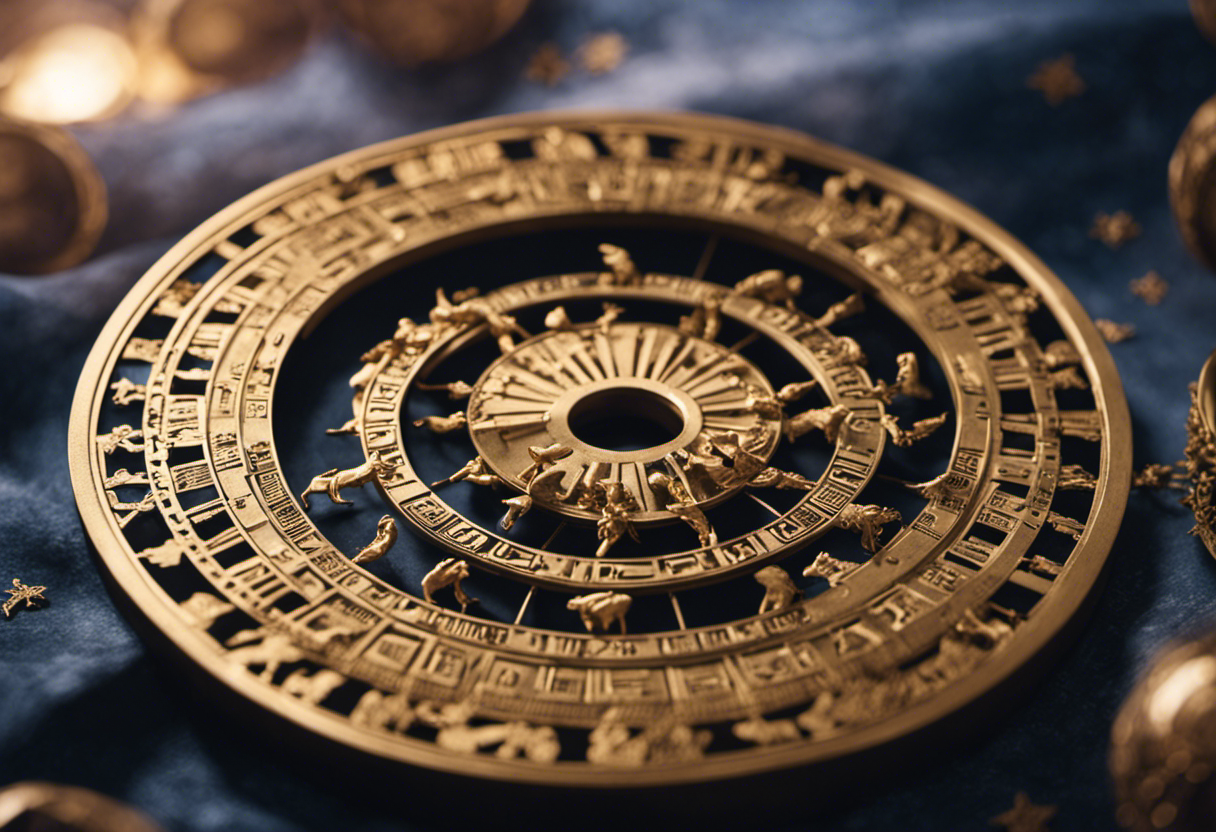

The origins of the ancient Greek calendar can be traced back to the early civilizations of the Mediterranean region. The development of the Greek calendar was influenced by various factors, including the agricultural practices, lunar observations, and religious beliefs of the ancient Greeks.
The Greek calendar initially relied on a lunar system, where the months were based on the phases of the moon. However, this lunar calendar did not align with the solar year, causing inconsistencies in timekeeping. To address this, the Greeks introduced intercalary months to synchronize the lunar and solar cycles, ensuring that their calendar remained accurate.
Over time, the Greek calendar underwent several modifications and reforms. The most notable development was the adoption of the Metonic cycle in the 5th century BCE. This 19-year cycle, named after the astronomer Meton of Athens, reconciled the lunar and solar years, providing a more precise method of timekeeping.
The origins and development of the ancient Greek calendar reflect the cultural, religious, and scientific advancements of the time. It served as a tool for tracking time, organizing religious festivals, and coordinating agricultural activities. The Greek calendar not only shaped the daily lives of the ancient Greeks but also played a significant role in their religious practices and cultural traditions.
The Gods and Goddesses of the Greek Pantheon
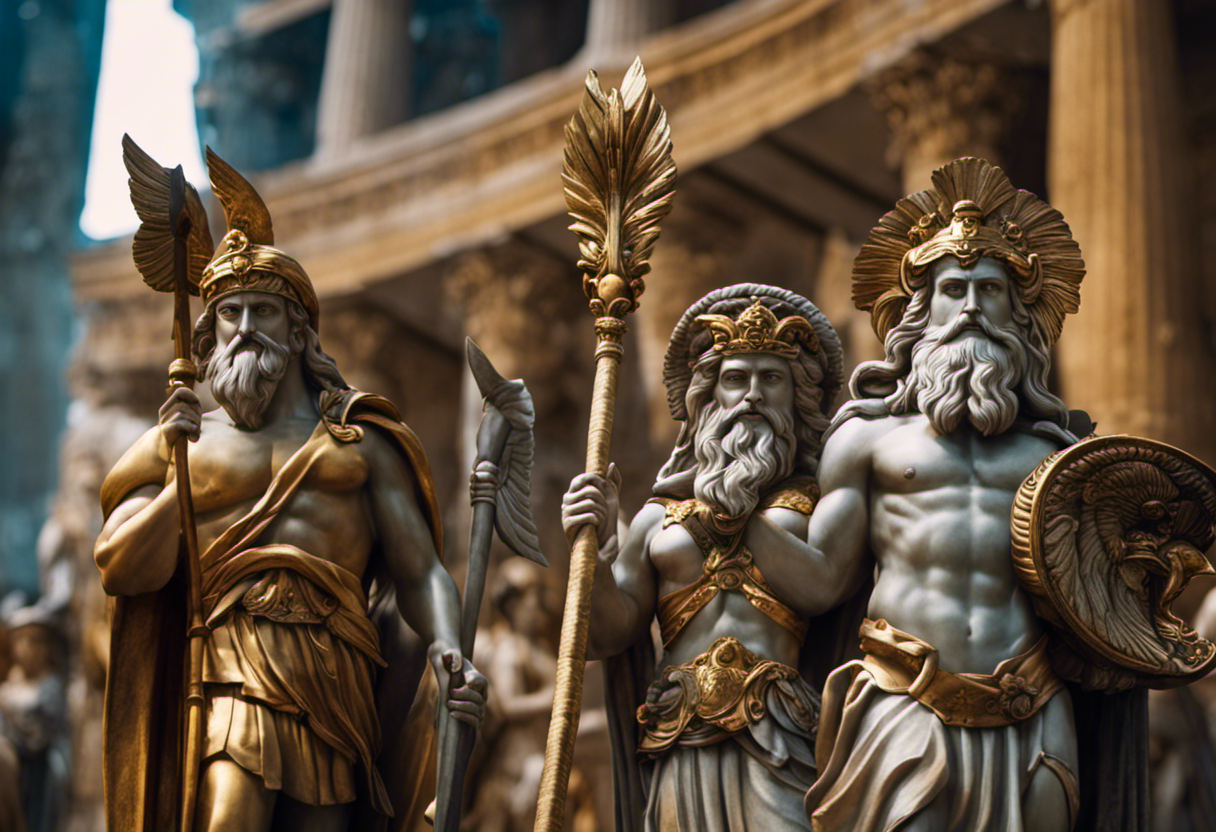

Divinity permeated every aspect of ancient Greek society, with the gods and goddesses of the Greek pantheon embodying the abstract ideals, values, and forces that governed their religious beliefs and practices. Greek mythology is filled with tales of these divine beings, who were worshipped and revered by the ancient Greeks. The Greek pantheon consisted of a multitude of gods and goddesses, each with their own unique characteristics and domains of influence.
At the head of the pantheon was Zeus, the king of the gods, who ruled over the sky and thunder. He was known for his strength and power, and was often depicted with a thunderbolt in his hand. Hera, his wife and sister, was the goddess of marriage and childbirth. She was a symbol of fertility and played a significant role in the lives of women.
Athena, the goddess of wisdom and warfare, was highly respected and worshipped by the Greeks. She represented strategic thinking and strategic warfare, and was believed to guide and protect heroes in battle. Apollo, the god of music and poetry, was associated with the arts and was considered the leader of the Muses.
Other notable gods and goddesses included Aphrodite, the goddess of love and beauty; Hermes, the messenger of the gods; Poseidon, the god of the sea; and Artemis, the goddess of the hunt and the moon. These divine beings were an integral part of Greek society, and their worship was central to religious ceremonies and rituals.
The Significance of Festivals and Celebrations
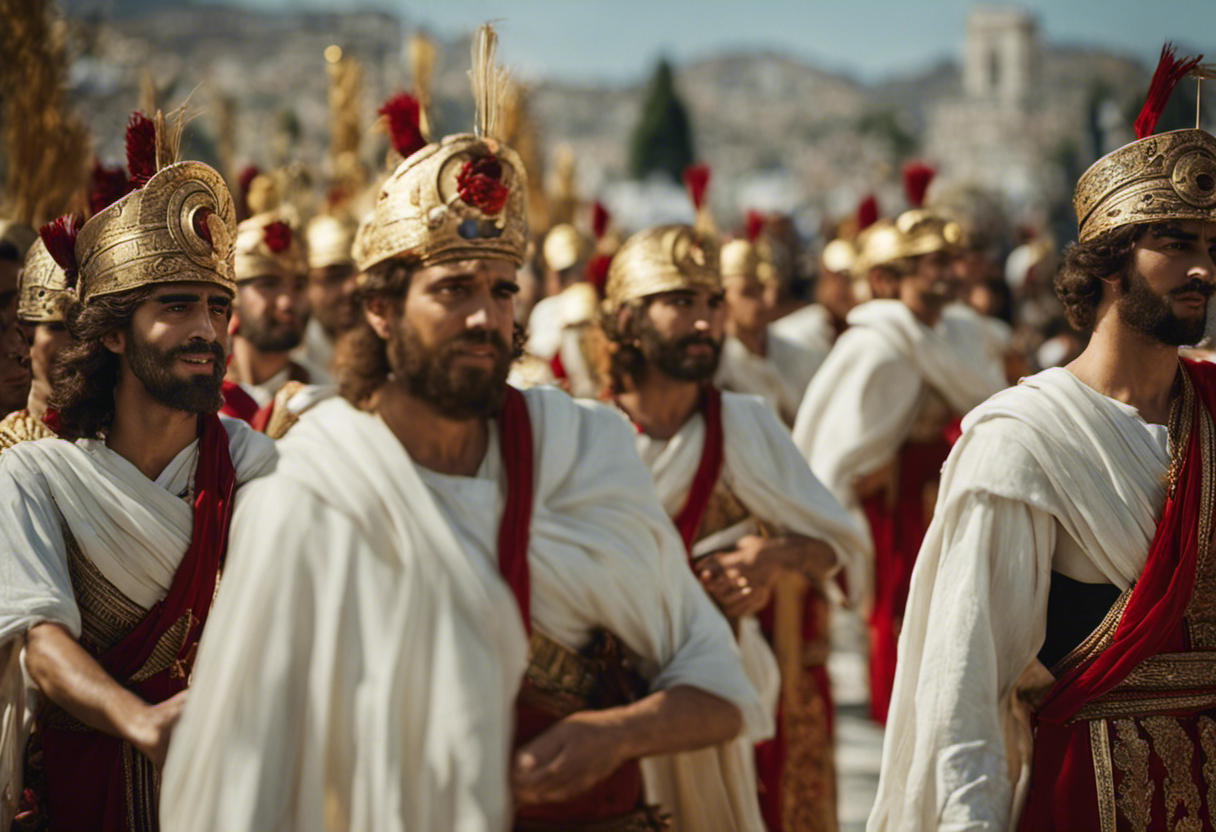

Moreover, festivals and celebrations played a crucial role in the religious practices of ancient Greeks, providing opportunities for communal worship and connection with the divine. The importance of communal participation in these events cannot be overstated. Festivals brought together individuals from various city-states, fostering a sense of unity and shared religious identity. These gatherings allowed people to collectively express their devotion and honor the gods, creating a sense of belonging and reinforcing social cohesion.
Symbolic meanings were deeply ingrained in Greek festivals and celebrations, serving as a means to communicate and preserve cultural values. For example, during the Dionysia festival, the dramatic performances of tragedies and comedies conveyed moral lessons, explored the human condition, and reflected upon societal norms. These theatrical productions were not simply entertainment; they carried profound messages and invoked emotions that resonated with the audience.
The cultural significance of festivals extended beyond religious devotion. These events provided opportunities for artistic expression, athletic competitions, and trade. The Olympic Games, for instance, were a religious festival held every four years in honor of Zeus. It showcased the physical prowess and skills of athletes from various Greek city-states, fostering friendly competition and promoting a sense of Greek identity.
Religious Rituals and Offerings
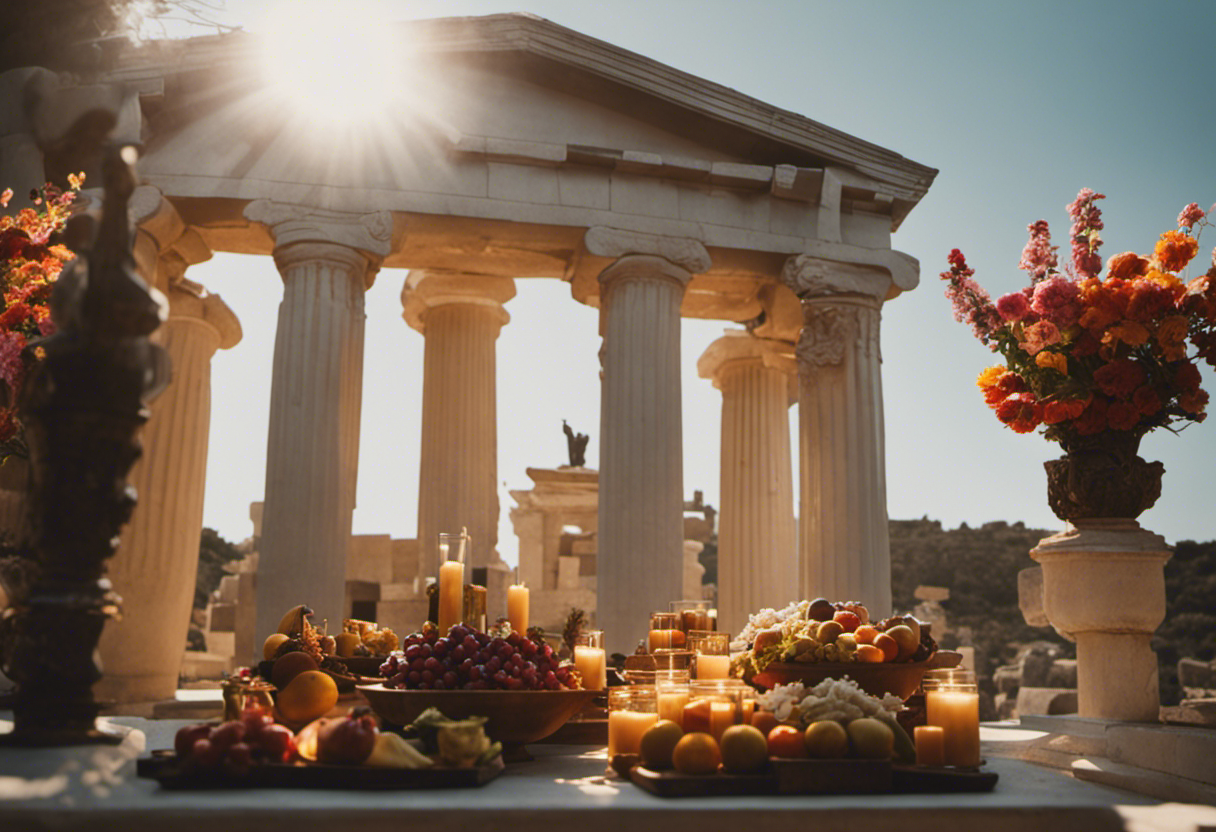

In addition, numerous religious rituals and offerings were an integral part of the ancient Greek calendar, serving as expressions of devotion and means to seek divine favor. These religious practices played a significant role in the lives of the ancient Greeks, as they believed in the direct influence of the gods in their daily affairs.
Here are two sub-lists that highlight some of the ritualistic ceremonies and offerings observed in ancient Greece:
Ritualistic Ceremonies:
- Sacrificial ceremonies: The ancient Greeks believed that offering sacrifices to the gods was a way to communicate with them and seek their blessings. Animals, such as goats, sheep, and pigs, were commonly used as sacrificial offerings. These ceremonies were usually performed in designated sacred spaces, such as temples or altars.
- Processions and Parades: Religious processions and parades were commonly conducted during festivals and special occasions. These events involved priests, worshippers, and sometimes even the participation of the entire community. They were a way to honor the gods and showcase devotion to the divine.
Offerings:
- Libations: Libations were ceremonial offerings of liquids, such as wine or water, poured onto the ground, altars, or statues of the gods. It was believed that the gods would consume the essence of the liquid and be pleased with the gesture.
- Food Offerings: Food offerings, such as fruits, grains, and honey, were presented to the gods as a sign of gratitude and respect. These offerings were often shared among the worshippers after being presented to the gods, reinforcing the sense of community and divine connection.
These religious rituals and offerings served as a way for the ancient Greeks to express their devotion and seek divine blessings. They were an important part of their religious and cultural identity, reinforcing their belief in the power and influence of the gods in their lives.
The Role of Temples and Sanctuaries
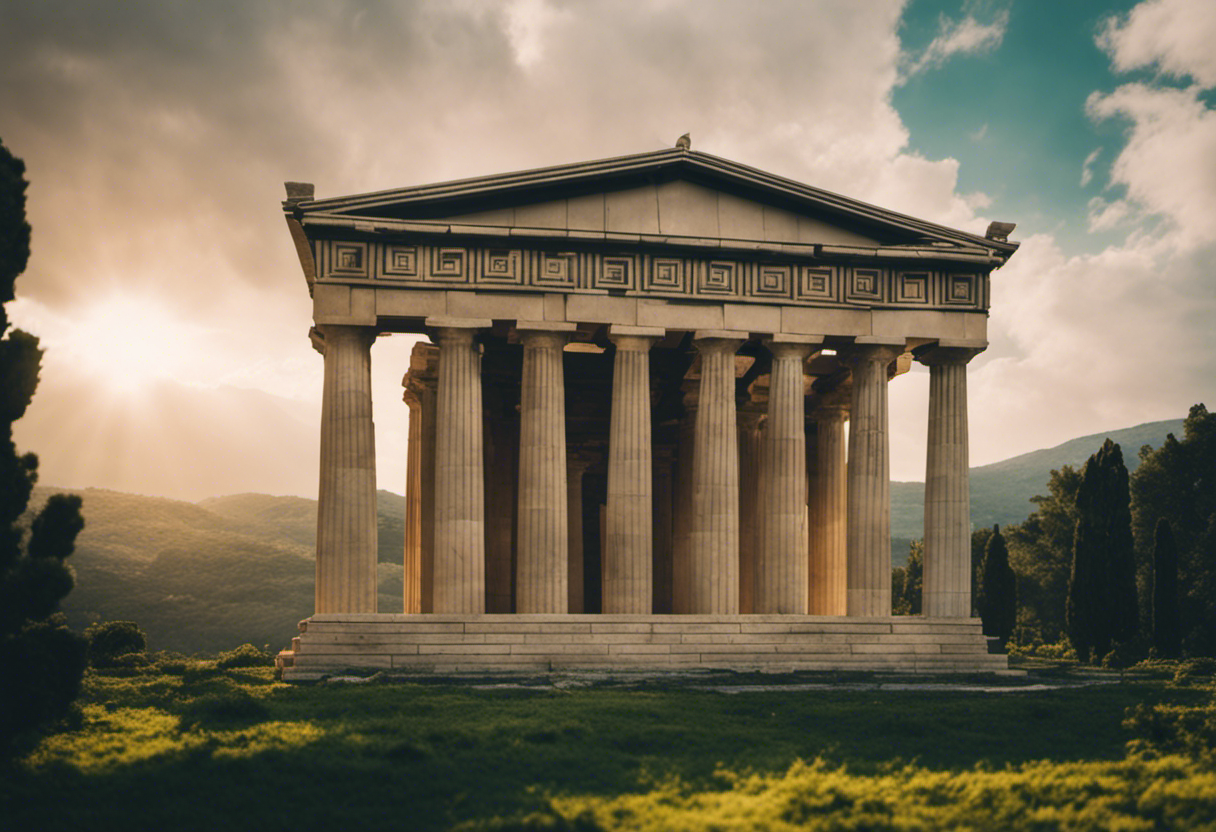

Temples and sanctuaries played a vital role in the religious practices of ancient Greece, serving as sacred spaces where worshippers could connect with the divine. The architecture of these structures was carefully designed to reflect the religious beliefs and rituals of the Greeks. Ancient Greek temples were typically built on elevated ground and featured a rectangular floor plan, with columns surrounding the exterior. These columns, known as Doric, Ionic, or Corinthian, were not just decorative elements but also symbolized the connection between the human and the divine.
Within these temples, priests held significant responsibilities. They acted as intermediaries between the worshippers and the gods, conducting rituals, offering sacrifices, and interpreting omens. The role of the priests was crucial in maintaining the sanctity of the temple and ensuring the proper performance of religious ceremonies.
The architecture of the temples and the rituals performed within them were closely intertwined. The grandeur and beauty of the temples were meant to inspire awe and reverence among the worshippers. The priests, through their actions and words, guided the worshippers in their quest for divine favor and protection.
Temples and sanctuaries served as physical manifestations of the religious beliefs of the ancient Greeks, providing a space where worshippers could express devotion and seek spiritual guidance. The role of priests and the architectural features of these sacred spaces were instrumental in facilitating the religious practices and maintaining the connection between the mortal and the divine.
The Astrological Influences on the Greek Calendar
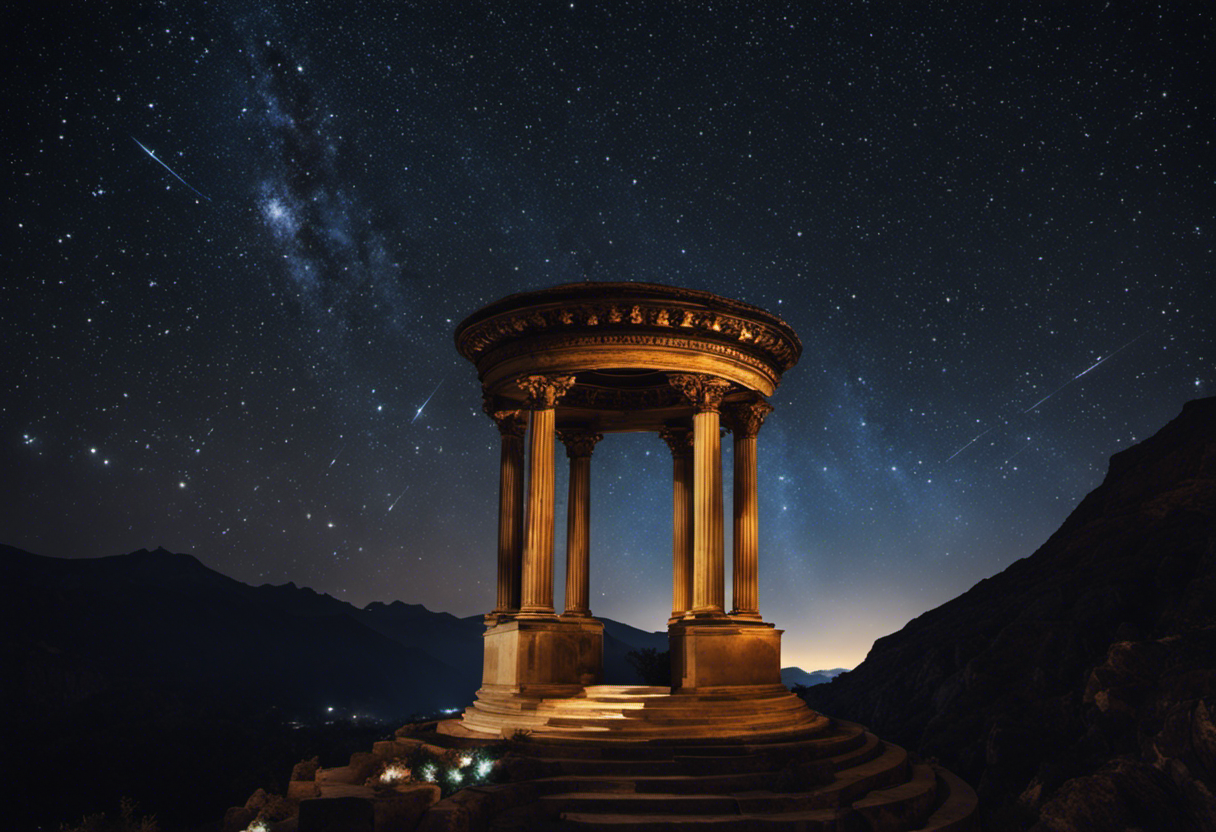

With an understanding of the role of temples and sanctuaries in ancient Greek religious practices, it is important to consider the astrological influences that shaped the organization and significance of the Greek calendar. The Greeks believed in the power of the stars and celestial bodies to influence human life and events. As a result, they incorporated astrological symbolism and zodiac influences into their calendar system.
The astrological influences on the Greek calendar can be seen in two main ways:
- Zodiac Significance: The Greeks divided the year into twelve months, each associated with a specific zodiac sign. These signs were believed to have a direct impact on the events and activities of that month. For example, the month of Aries was associated with new beginnings and the start of the agricultural year, while the month of Leo was linked to the height of summer and the harvest season.
- Astrological Festivals: The Greeks celebrated various festivals throughout the year that were tied to astrological events. For instance, the festival of Anthesteria, held in the month of Anthesterion, marked the arrival of spring and the rebirth of nature, aligning with the astrological transition from Pisces to Aries.
The Legacy of the Ancient Greek Calendar in Modern Times


Two significant ways in which the ancient Greek calendar continues to leave a lasting impact on modern times are its influence on Western astrology and its contribution to the development of our current calendar system.
The connection between the ancient Greek calendar and the modern Gregorian calendar is undeniable. The Gregorian calendar, which is widely used across the world today, was developed in the 16th century and is based on the ancient Roman calendar, which in turn was heavily influenced by the Greek calendar. The Greek calendar introduced the concept of dividing the year into months, with each month having a specific number of days. This concept was adopted by the Romans and eventually by the creators of the Gregorian calendar.
Moreover, the impact of the ancient Greek calendar on Greek mythology and its cultural significance in modern society cannot be ignored. The ancient Greeks associated specific gods and goddesses with different months and days of the year. These associations were deeply ingrained in their religious and cultural practices. Today, we still see remnants of this cultural significance in the names of our months. For example, January is named after Janus, the Roman god of beginnings, while March is named after Mars, the Roman god of war. This connection between the ancient Greek calendar and mythology has had a lasting influence on our perceptions and understanding of time.
Conclusion
In conclusion, the ancient Greek calendar held great religious significance in the lives of the ancient Greeks. It not only served as a means to organize time but also played a crucial role in the worship of their gods and goddesses.
The festivals, rituals, and offerings associated with the calendar were central to the religious practices of the Greeks. Even in modern times, the legacy of the ancient Greek calendar can still be seen in various aspects of our lives, reminding us of the rich cultural and religious heritage of ancient Greece.
As the adage goes, ‘Time is the wisest counselor.’

